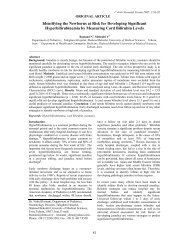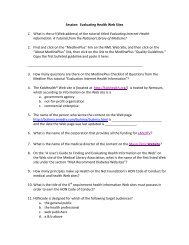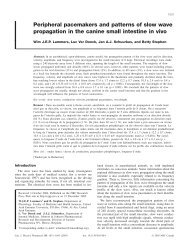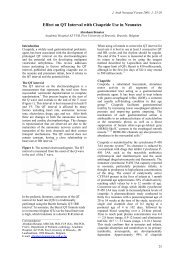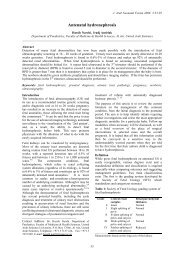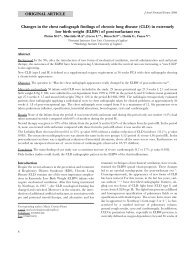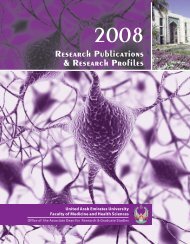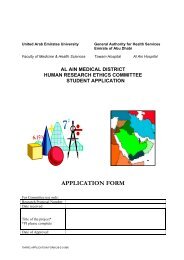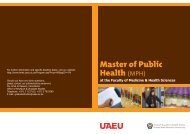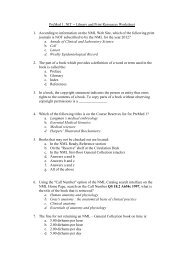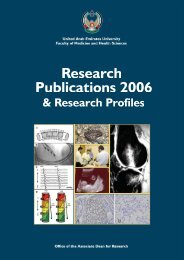Community Medicine Abstracts - College of Medicine and Health ...
Community Medicine Abstracts - College of Medicine and Health ...
Community Medicine Abstracts - College of Medicine and Health ...
You also want an ePaper? Increase the reach of your titles
YUMPU automatically turns print PDFs into web optimized ePapers that Google loves.
Project No. 219 (2005)Prevalence <strong>of</strong> Type A Behaviour <strong>and</strong> Stress Coping Strategies Among FMHSMedical Students in Al Ain, UAEStudent Authors: Raya Abdulla Mohd Salem Al-Mazrooei, Amna Obaid Ali Bedwawi,Noura Khamis Al-Ghaithi, Lamyaa Essa Khalifa Al AliFaculty Supervisors: Dr. F. Al Maskari, Dr. M. GrivnaAbstract:Objectives: To compare prevalence <strong>of</strong> type A behavior between the male <strong>and</strong> femalemedical students. To compare stress management between students in differentacademic years, <strong>of</strong> both genders <strong>and</strong> hostel <strong>and</strong> home residents. To define thefacilities required by the students to help them cope with stress.Methods: The study was done on a complete sample <strong>of</strong> all the students in the FMHS,Al-Ain city, UAE. The study was conducted between 17 <strong>and</strong> the 21 September 2005.Data were collected by a cross-sectional descriptive <strong>and</strong> analytic survey. Data analysiswas done using SPSS. Observed differences were tested for significance using Chisquare.Results: The response rate in the study was 88%. Over two thirds <strong>of</strong> the students(68%) have type A behavior. It is more prevalent among female students (73%)compare to male students (56%) (p=0.012). There is no statistical significantassociation between the prevalence <strong>of</strong> Type A behavior <strong>and</strong>: age, marital status,family income, sponsorship or BMI. The students use different strategies to cope withstress. Only 34% <strong>of</strong> the students agree they have a close relationship with theirmentor or advisor. Female students tend to share their frustrations with otherscompare to male students (p=0.006). Most <strong>of</strong> the students (64%) chose to share theirfrustrations with their friends <strong>and</strong> only (2.4%) share their frustrations with theirmentor. The younger the age <strong>of</strong> the students, the more tendency to use the followingstrategies: relaxation techniques (p= 0.033), the effective utilization <strong>of</strong> others inaccomplishing study assignment (p=0.011), <strong>and</strong> encouraging others to come withrecommended solutions for their problems (p=0.005). The higher the family income <strong>of</strong>the students, the more tendency to use relaxation techniques (0.023) <strong>and</strong> to sharetheir frustrations with others (p=0.026). Single students tend to take problems asopportunities for improvements more than married students (p=0.033). The studyassessed the stressors among the students <strong>and</strong> found that 82% <strong>of</strong> the students haveexams as a stressor while 51% consider death or illness in the family as a stressor.Other stressors include: stress in the family (33%), study (29%) <strong>and</strong> socialrelationships (24%). The students practice different activities to relieve stress, withmore than half <strong>of</strong> them watch TV <strong>and</strong> 47 % use internet. The students wish to havedifferent facilities <strong>and</strong> activities in the faculty <strong>and</strong> the hostel. High percentage <strong>of</strong> themasked for gymnastic-swimming pool <strong>and</strong> recreation center (54%), to go for trips(52%) <strong>and</strong> to have more open days (46%).Conclusion <strong>and</strong> Recommendation: The Prevalence <strong>of</strong> Type A Behavior among FMHSmedical students in FMHS is high (68.2%). Despite the fact that the students are usingdifferent strategies <strong>and</strong> activities to cope with their stress, the prevalence <strong>of</strong> thisbehavior type is high. This high rate requires attention to develop suitable strategies inorder to deal with its implications on the students. The students have many stressorsthat could contribute to evoke type A behavior with exams as major stress forstudents.The FMHS mentor system could have played an important role to guide the students<strong>and</strong> help them to deal with the stressors. However, according to the findings <strong>of</strong> thisstudy, the role is not that obvious. More effort should be put to improve this role. Thestudents asked for different facilities <strong>and</strong> activities to help them relieving their stress.The effective co-operation between the faculty <strong>and</strong> the hostel would contribute to thesuccessful implantation <strong>and</strong> improvements <strong>of</strong> these facilities <strong>and</strong> activities.



